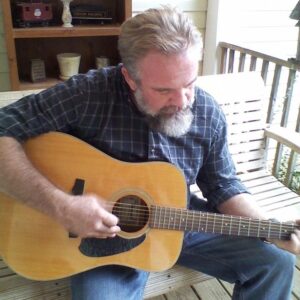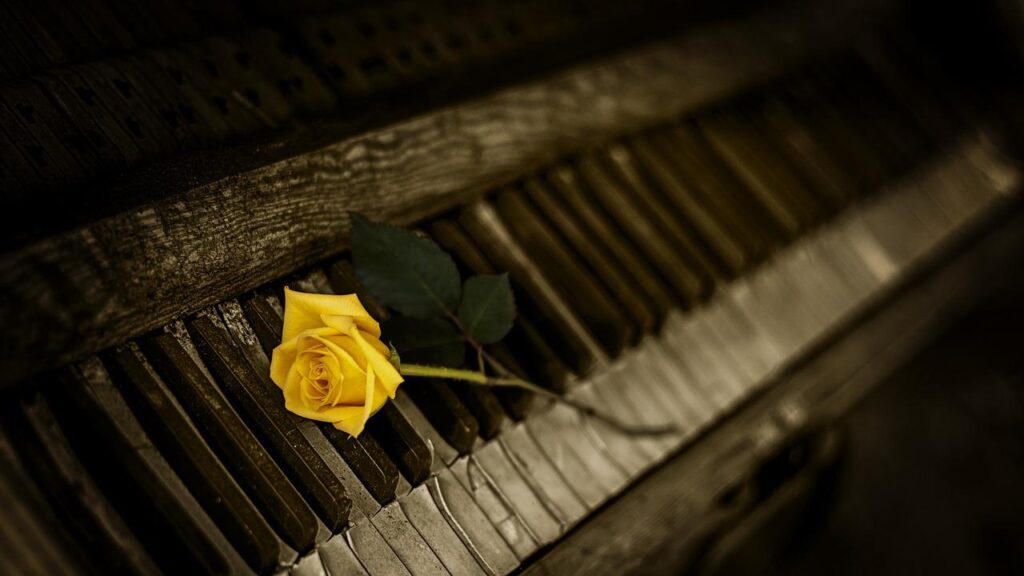Image by Martyn Cook from Pixabay
The Girl used her index finger to strike the center key over and over again. The solitary note rang out through the empty country church. Every Sunday, while the bulk of the congregants lingered in the church yard, the Girl waited for just a few moments alone with that middle C.
The sweet blue-haired lady who played the instrument at all the services told her that was where the music began, right there in the center.
Next to the Mother, the Girl loved the blue-haired lady most of all, her pale face, her red lips, her clean and pressed dresses, how she always smelled of powder. The Girl wondered if all the ladies who lived in the town smelled of powder and had faces as white as piano keys. The Girl loved the pale, pressed, and powdered lady who made the instrument ring at every service, even on the hot summer revival nights when the country women, who were never powdered, pressed, or pale, frantically fanned themselves against the Baptist mosquitos, the damp heat, and the brimstone fear.
More than anything, more than a blue flowered dress, more than crackling corn bread, more than anything, more even than a Father, more even than the Mother’s tomato soup, the Girl longed for a piano, but somehow believed that prideful longing was sin, and fearing brimstone, she asked God for forgiveness for wanting a Father, a piano, and even a dress, promising Him to be satisfied with just the soup and the bread. But it was too late. The promise of the notes were already in her head. She envisioned each integrated key, ebony and ivory, and tried to see her tiny finger making each note ring out as she composed music only she could hear.
One Easter Sunday, the Girl absorbed the notes, their lifts, falls, patterns and formulas, and bravely bore the prayers and preaching, waiting for more notes. She waited. She was always waiting. Finally the service was over and the congregants sauntered for the wagons and cars in the church yard, and still she waited. The Mother always buttonholed the deacon, the keeper of the door key, distracting him, granting the Girl a few more minutes with the piano before he would lock her out for yet another week.
As soon as the last congregant crossed the threshold, the Girl sprinted to the front, longing for the feel of the keys, but something stopped her. A folder rested on the piano stool. Her name was on the folder. In the folder was an opus of papers with strange lines and shapes and letters. These were the secrets the sweet powdered lady knew. The Girl had watched the powdered lady reading these sheets. She didn’t know what they said, but she believed they were the words of God, as surely as were those red words King James had compiled those three and a half centuries before.
In addition to the pages, in the very back of the folder, was a cardboard cutout of piano keys. She unfolded the cutout and confirmed that it matched perfectly with the very real keys before her.
She clutched her treasure close to her breast.. She was sure God had rewarded her for her contrition, and that He and the powdered lady could indeed answer prayers. She was happy, as much as any girl dressed in a flour sack ever was.
School was out for Spring planting, and when the Girl awoke Monday morning, she found that the Mother had taped the cutout to the kitchen table and moved the family breakfast to the other side. So, for the whole next week, while the older Brother, who was first a farmer, and then a sailor, and then a farmer again, evinced the Spring soil to the sun,dropped in the seeds, and turned it under, she made music that sounded like tapping to the Mother but sounded like an etude to the Girl.
The next week, the mom told her she could take a few of the sheets to school with her if she promised to only study them during recess. At recess, she took her sheets and sat under the water oak at the far edge of the playground. She just knew those lined papers were a map to a new land.
The Girl was so absorbed in that she didn’t notice the Twins.
The Twins commanded the playground just as their father commanded the mill, the council, and the town. They were bigger than the other boys, much larger than the sharecroppers whose plates were never full and whose empty bellies sometimes swole when the winter smokehouse stood bare. They combed their shiny black hair, wore shiny black shoes, and donned pants that were neither two long nor too short. They broke the pencils of the weaker boys, the country boys, and laughed at their pants and overalls that were always too short or too long. They made a sport of chasing the good boys and pushing them in the mud. They stalked the lot, their lackeys in tow, talking dirty and smoking stolen Lucky Strikes.
All the girls tried to be invisible to the Twins, hoping they might pass unmolested. They knew that edges and dark corners were not safe. The Girl knew these things too, but had forgotten just this once. She had gone out too far with her lined and dotted sheets. She stood up and tried to run, but the Twins and their friends had surrounded her.
She would only remember what happened incrementally as she grew older, as if her very heart protected her, only allowing her to see and hear those things when she was ready. She first remembered how they laughed at her dress, how they almost roared when they pulled up that dress and saw the bloomers the Mom had made for her, how they tore those bloomers off and threw them in the red dirt. Then, years later, when a decent boy tried to kiss her on the cheek, when she was ready to finally remember, to really remember, she recalled the hands that were on her and then in her, and those magic music sheets she left behind when those hands finally let her go.
 Alan Caldwell is a brand new writer. He lives in Carroll County Georgia, but is working on moving to his rural property in the mountains of Northeast Alabama. He has been married to his lovely wife, Brandi, for 33 years. He has one son, Caleb, who is a firefighter, a daughter-in-law, Chelsee, who is an emergency room nurse, and a brand new grandson, Asher. Alan has been teaching for 26 years and spends much of his free time outdoors or reading. Alan has been collecting stories, mostly about his family, for over 40 years, but has just begun writing them down. Middle C is a true story about his mom that she revealed not long before she died in 2019.
Alan Caldwell is a brand new writer. He lives in Carroll County Georgia, but is working on moving to his rural property in the mountains of Northeast Alabama. He has been married to his lovely wife, Brandi, for 33 years. He has one son, Caleb, who is a firefighter, a daughter-in-law, Chelsee, who is an emergency room nurse, and a brand new grandson, Asher. Alan has been teaching for 26 years and spends much of his free time outdoors or reading. Alan has been collecting stories, mostly about his family, for over 40 years, but has just begun writing them down. Middle C is a true story about his mom that she revealed not long before she died in 2019.
